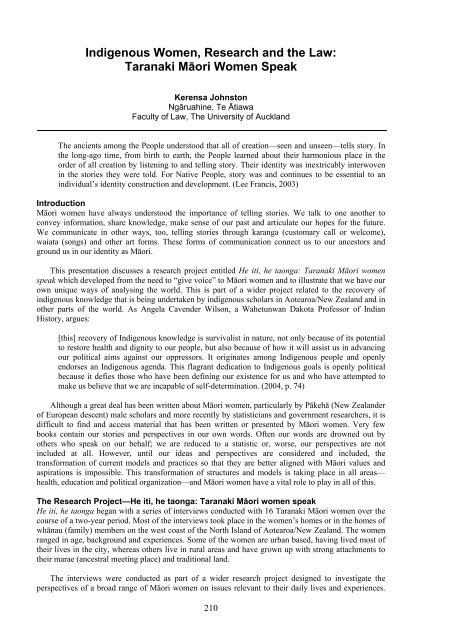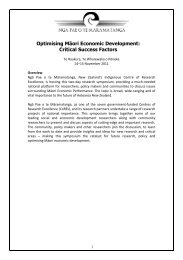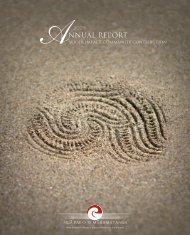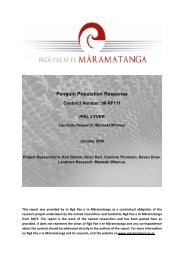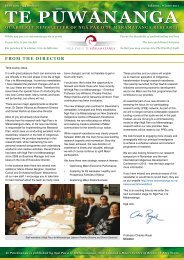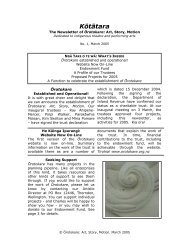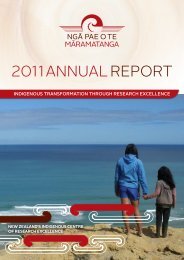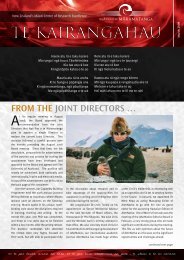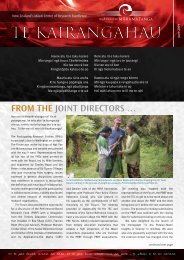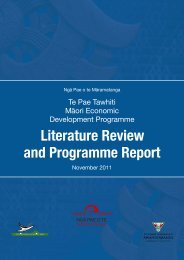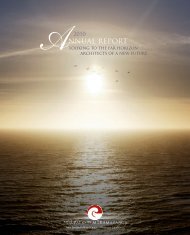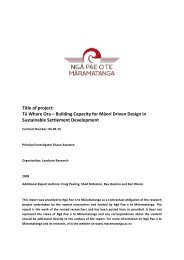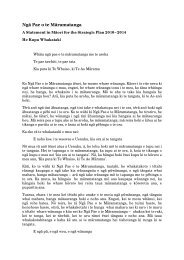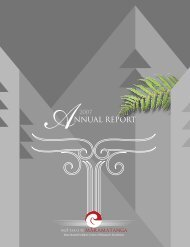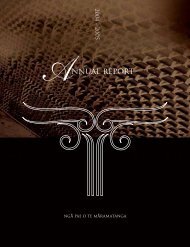traditional knowledge conference 2008 te tatau pounamu
traditional knowledge conference 2008 te tatau pounamu
traditional knowledge conference 2008 te tatau pounamu
Create successful ePaper yourself
Turn your PDF publications into a flip-book with our unique Google optimized e-Paper software.
Indigenous Women, Research and the Law:Taranaki Māori Women SpeakKerensa JohnstonNgāruahine, Te ĀtiawaFaculty of Law, The University of AucklandThe ancients among the People understood that all of creation—seen and unseen—<strong>te</strong>lls story. Inthe long-ago time, from birth to earth, the People learned about their harmonious place in theorder of all creation by lis<strong>te</strong>ning to and <strong>te</strong>lling story. Their identity was inextricably in<strong>te</strong>rwovenin the stories they were told. For Native People, story was and continues to be essential to anindividual’s identity construction and development. (Lee Francis, 2003)IntroductionMāori women have always understood the importance of <strong>te</strong>lling stories. We talk to one another toconvey information, share <strong>knowledge</strong>, make sense of our past and articula<strong>te</strong> our hopes for the future.We communica<strong>te</strong> in other ways, too, <strong>te</strong>lling stories through karanga (customary call or welcome),waiata (songs) and other art forms. These forms of communication connect us to our ancestors andground us in our identity as Māori.This presentation discusses a research project entitled He iti, he taonga: Taranaki Māori womenspeak which developed from the need to “give voice” to Māori women and to illustra<strong>te</strong> that we have ourown unique ways of analysing the world. This is part of a wider project rela<strong>te</strong>d to the recovery ofindigenous <strong>knowledge</strong> that is being undertaken by indigenous scholars in Ao<strong>te</strong>aroa/New Zealand and inother parts of the world. As Angela Cavender Wilson, a Wahetunwan Dakota Professor of IndianHistory, argues:[this] recovery of Indigenous <strong>knowledge</strong> is survivalist in nature, not only because of its po<strong>te</strong>ntialto restore health and dignity to our people, but also because of how it will assist us in advancingour political aims against our oppressors. It origina<strong>te</strong>s among Indigenous people and openlyendorses an Indigenous agenda. This flagrant dedication to Indigenous goals is openly politicalbecause it defies those who have been defining our exis<strong>te</strong>nce for us and who have at<strong>te</strong>mp<strong>te</strong>d tomake us believe that we are incapable of self-de<strong>te</strong>rmination. (2004, p. 74)Although a great deal has been writ<strong>te</strong>n about Māori women, particularly by Pākehā (New Zealanderof European descent) male scholars and more recently by statisticians and government researchers, it isdifficult to find and access ma<strong>te</strong>rial that has been writ<strong>te</strong>n or presen<strong>te</strong>d by Māori women. Very fewbooks contain our stories and perspectives in our own words. Of<strong>te</strong>n our words are drowned out byothers who speak on our behalf; we are reduced to a statistic or, worse, our perspectives are notincluded at all. However, until our ideas and perspectives are considered and included, thetransformation of current models and practices so that they are bet<strong>te</strong>r aligned with Māori values andaspirations is impossible. This transformation of structures and models is taking place in all areas—health, education and political organization—and Māori women have a vital role to play in all of this.The Research Project—He iti, he taonga: Taranaki Māori women speakHe iti, he taonga began with a series of in<strong>te</strong>rviews conduc<strong>te</strong>d with 16 Taranaki Māori women over thecourse of a two-year period. Most of the in<strong>te</strong>rviews took place in the women’s homes or in the homes ofwhānau (family) members on the west coast of the North Island of Ao<strong>te</strong>aroa/New Zealand. The womenranged in age, background and experiences. Some of the women are urban based, having lived most oftheir lives in the city, whereas others live in rural areas and have grown up with strong attachments totheir marae (ancestral meeting place) and <strong>traditional</strong> land.The in<strong>te</strong>rviews were conduc<strong>te</strong>d as part of a wider research project designed to investiga<strong>te</strong> theperspectives of a broad range of Māori women on issues relevant to their daily lives and experiences.210


